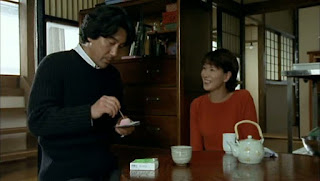Notable for the enormous number of cuts used in the film, which was startling at the time. Oshima may have wanted to suggest the fracturing of modern society with the technique, but given this has become how a lot of modern film looks nowadays (borrowing from innovations in advertising and music videos from the mid-1980s onwards) it just makes this 1960s artifact look sleek and dynamic. The opressiveness of rural poverty doesn't feel quite as grinding when sliced up into 20 shots a minute.
It's a tale of a violent rapist and serial killer and the two women that cover for him – they are in love with this monster and confused about what to do. Oshima begins the film in quite an uncomfortable way by implicating the viewer in the horrific actions of the criminal – his victim is sized up and then attacked largely from his point-of-view. Perhaps the suggestion is that we all have this capacity for sexual violence, Eisuke just can't control himself. At the end of the film he gives contradictory explanations for his behaviour, saying that the love of a beautiful woman might have caged these beastly impulses, and then going on to say he probably would have committed his crimes anyway.

Oshima is reluctant to explain away his behaviour as a product of poverty or neglect. In one of the most famous lines in the film, Eisuke sarcastically tells the teacher he has married that she taught him democracy. His behaviour isn't some holdover from the belligerent hypernationalism of the war years. Although his criminality emerges from the background of the failure of a collective farm, its clear that his capacity for violence and anti-social tendencies are there from the start. Oshima seems to be indicating that the ideals of humanity and love taught to children in schools are contradicted not just by conditions on the ground, but by human nature.
Eisuke's frustrated and murderous energy is contrasted by Genji – the depressive son of the head of the village, who vies with him for the affections of the two female characters. Genji despairs at the political responsibilities he is due to inherit. He is a good man put in an impossible situation, and resolves on suicide – whatever violent impulses he has are directed inwards. The relationship with his lover Shino begins as a commercial exchange (she borrows money to start a trout farm), but she is dutifully willing to join him in death. Eisuke's sexual jealousy inadvertently saves her life – he tries to rape her corpse, which revives her, but begins his descent into depravity.
Jealousy emerges as the dominant theme between the two female characters as well – Eisuke's wife Matsuko resents Shino's hold over Eisuke's sexual imagination. They are both dumbfounded by Eisuke's behaviour, and take too long to stop treating it as a private matter between themselves and give him up to the police. Women's misplaced sense of duty and devotion to men may be in Oshima's sights here. Outdated and oppressive gender norms end up perpetuating Eisuke's killing spree.
There's a lot going on in the film, and a lot of it is ambiguous or contradictory. For me it doesn't have the brutal clarity of Oshima's earliest films Naked Youth and The Sun's Burial, which are scrappier affairs, less formally innovative and more thematically direct. Violence at Noon is richer and more mysterious, the two women have more opportunities to escape the violent man that in other Oshima films, and yet frustratingly they remain infatuated with him.
 Thirst for Love by Yukio Mishima
Thirst for Love by Yukio Mishima






